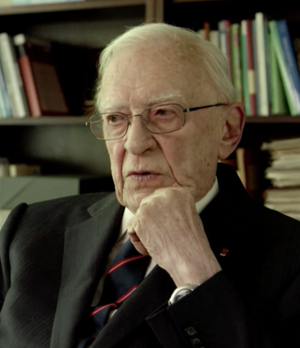Marcel Boiteux
(economist, mathematician, deep state operative) | ||||||||||||
|---|---|---|---|---|---|---|---|---|---|---|---|---|
 | ||||||||||||
| Born | 9 May 1922 | |||||||||||
| Nationality | French | |||||||||||
| Member of | Le Siècle, Trilateral Commission | |||||||||||
President of Le Siècle who worked his whole career for Électricité de France and created French energy independence with nuclear power. Bilderberg/1973.
| ||||||||||||
Marcel Boiteux is a French economist , mathematician and senior civil servant. He was President of the deep state dining club Le Siècle. He was a member of the Trilateral Commission (1980-1996) and attended the 1973 Bilderberg meeting.
A pupil of Maurice Allais, he entered the Électricité de France in 1949, where he spent his entire career. He directed it from 1967 to 1987. In this capacity, he was is one of the architects of the development of the nuclear industry in France, which created a French energy independence.
Early life
Marcel Boiteux did his schooling at the Lycée Michel-Montaigne in Bordeaux, then in Rouen.[1] He graduated in 1942. In 1947, he also graduated, in economics, from the Paris Institute of Political Studies where he was a fellow student of Pierre Moussa.[2]
To avoid the the Vichy government's mandatory work service (STO), Boiteux went through Spain to engage on the Free French side in the campaigns of Italy and France.[3][4]
Marcel Boiteux began his professional career in 1946 by entering the National Center for Scientific Research (CNRS), under the responsibility of Maurice Allais and having Gérard Debreu as a colleague.
He joined EDF on April 1, 1949, as an engineer in the sales department on the recommendation of Maurice Allais.
Électricité de France
During the 1950s, he rebuilt electricity pricing system and participated in the development of a rational approach to the choice of investments. In 1956, he obtained the status of engineer in the department of general economic studies, then director of economic studies at the general management in 1958. In January 1967, he was appointed Deputy Managing Director, then Managing Director from September 20, 1967 until February 1, 1979.[5] He succeeds André Decelle, who resigned, on the proposal of Pierre Massé, then chairman of the board of directors of EDF. It was only by becoming general manager that he really tackled the problems of nuclear power.
At the time of the 1973 oil crisis, EDF was thus ready for the transition to "all-nuclear" investment programs, and made a commitment to the government to set up an expedited roll-out, with 7 to 8 nuclear plants per year from 1974. To reduce investment costs, Marcel Boiteux decided to standardize and standardize the manufacture of nuclear power plants throughout France.
Bomb attack
On July 8, 1977, he escaped a terrorist bomb attack on his home. The explosives, placed in front of the armored main entrance of his house, cause very serious material damage. According to the investigation, the charges were sufficient to kill if Marcel Boiteux and his family had not been at the other end of the house at the time. Responsibility for the attack was claimed by an “action committee against atomic scoundrels” (CAcCA).[6]
On July 12, 1977, to enable France to export nuclear power plants, particularly to Morocco or Syria[7] (a plan not very popular in Israel, hence maybe the "CAcCA bomb"), he created the "Sofratome" (French company for nuclear studies and achievements), which is a subsidiary of EDF. He succeeded Paul Delouvrieras as Chairman of the EDF Board from 1979 to May 6, 1987.[8]
Event Participated in
| Event | Start | End | Location(s) | Description |
|---|---|---|---|---|
| Bilderberg/1973 | 11 May 1973 | 13 May 1973 | Sweden Saltsjöbaden | The meeting at which the 1973 oil crisis appears to have been planned. |
References
Wikipedia is not affiliated with Wikispooks. Original page source here